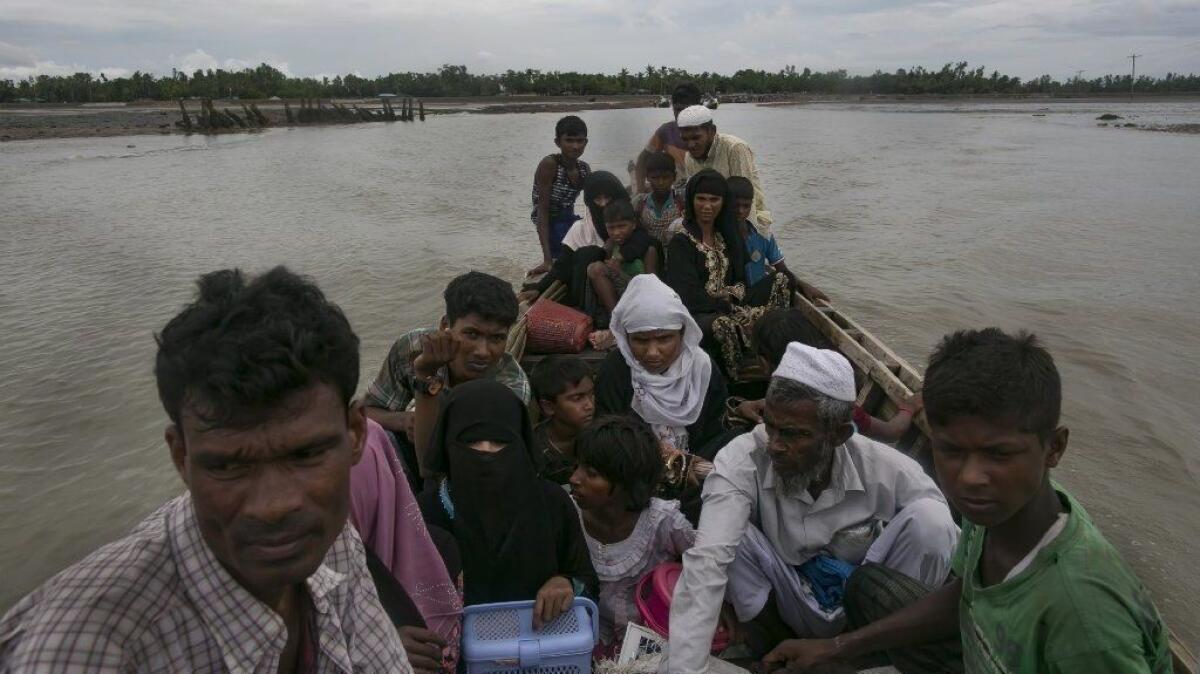The U.N. says Rohingya Muslims are facing ethnic cleansing in Myanmar. So why is India trying to kick them out too?

- Share via
Reporting from Mumbai, India — More than 400,000 Rohingya Muslims have streamed out of Myanmar in recent weeks, fleeing a bloody military crackdown that a top United Nations official described as “a textbook example of ethnic cleansing.”
Now the Rohingya are facing expulsion from another country: India, where an estimated 40,000 refugees are scattered amid a population of 1.3 billion.
The Indian government on Monday told the country’s Supreme Court that the Rohingya population posed a threat to national security and that intelligence reports suggested some refugees had links to militant groups based in Pakistan.
India’s Hindu nationalist government made the allegations in an affidavit arguing that the country’s highest court should not block its efforts to deport Rohingya refugees.
“India is already saddled with a very serious problem of illegal migrants and is attempting to address the situation in the larger interest of the nation,” the government said.
For several weeks, officials have said they would like to expel the Rohingya, who they say are in the country illegally. Human rights groups say such a move would violate international laws against sending refugees back to countries where they face persecution.
The Buddhist majority in Myanmar, also known as Burma, has long been accused of oppressing the Rohingya, an ethnic and religious minority of some 1 million people living mostly in the country’s western Rakhine state. The violence has exploded since Aug. 25, when a Rohingya militant group attacked Myanmar police checkpoints, killing a dozen officers.
The Myanmar army has responded with severe force, shooting civilians and setting fire to villages, according to accounts compiled by international human rights groups. As of Saturday, the U.N. said, 412,000 Rohingya had escaped over the border into Bangladesh. Myanmar’s government says about 400 people have been killed, nearly all of them militants.
The Rohingya are sometimes described as one of the world’s most mistreated minority groups. Myanmar refuses to grant them citizenship, calling them interlopers from Bangladesh even though many families trace their lineage in the country back several generations.
Thailand, which borders Myanmar to the east, has routinely pushed back boats carrying Rohingya refugees attempting to cross the Andaman Sea to reach safety in the Muslim-majority nations of Malaysia or Indonesia.
The move by India means there is one less country willing to accept the Rohingya.
Many Rohingya Muslims living in the overwhelmingly Hindu country arrived following an eruption of communal violence in 2012 in Rakhine state. There are pockets of several thousand Rohingya in New Delhi, Hyderabad, the northern city of Jammu and three other areas in the country, according to Indian officials.
About 16,500 Rohingya in India are registered with the U.N. refugee agency, which said last month that it had not been informed of any official plan to deport the refugees.
The group lived in relative peace until this year, when right-wing Hindus in Jammu began putting up signs calling on the Rohingya to leave the city, saying they posed a security threat. The leader of the group said he would “identify and kill” Rohingyas if authorities did not take action.
Current and former officials in Jammu and Kashmir state – the only one in India with a majority Muslim population – said they had seen no evidence that the refugees were involved in terrorism or other major crimes.
Omar Abdullah, the top official in the state until January 2015, tweeted Monday, “No such intelligence reports ever came up for discussion” while he was in office.
But India’s central government said in August that “infiltration” by migrants from Rakhine state, “besides being [a] burden on the limited resources of the country also aggravates…security challenges.”
In the affidavit filed Monday, the Indian government alleged that the Rohingya were a threat to Indian citizens, arguing that Islamic State could use the refugees to carry out attacks and that the arrival of migrants was changing the demographics in border states.
The government argued that it was not a signatory to U.N. refugee conventions. But human rights experts said that sending Rohingya back to Myanmar would violate international laws against “refoulement,” or forcibly returning refugees to countries where they faced a credible threat of persecution.
“The Indian government… cannot return the Rohingya to a country that is engaged in ethnic cleansing against the Rohingya,” said Meenakshi Ganguly, South Asia director for Human Rights Watch.
“If there are credible security threats, instead of condemning the entire community, just as the Burmese are, Indian authorities can prosecute any militant suspects by producing evidence in court.”
Some Muslims viewed India’s actions as another example of the country’s growing intolerance for religious minorities under Prime Minister Narendra Modi, a staunch Hindu nationalist.
While Muslim-majority countries across Asia have criticized Aung San Suu Kyi, the leader of Myanmar’s governing party — and some have called for her Nobel Peace Prize to be rescinded — Modi in a meeting this month praised her leadership and expressed concern over “extremist violence,” but did not mention the Rohingya.
Follow @SBengali on Twitter for more news from South Asia
ALSO
From Malala to the Taliban, anger across Asia at Myanmar’s violence against Rohingya Muslims
How a humanitarian crisis tarnished Nobel winner Aung San Suu Kyi’s legacy, perhaps forever
More to Read
Sign up for Essential California
The most important California stories and recommendations in your inbox every morning.
You may occasionally receive promotional content from the Los Angeles Times.











